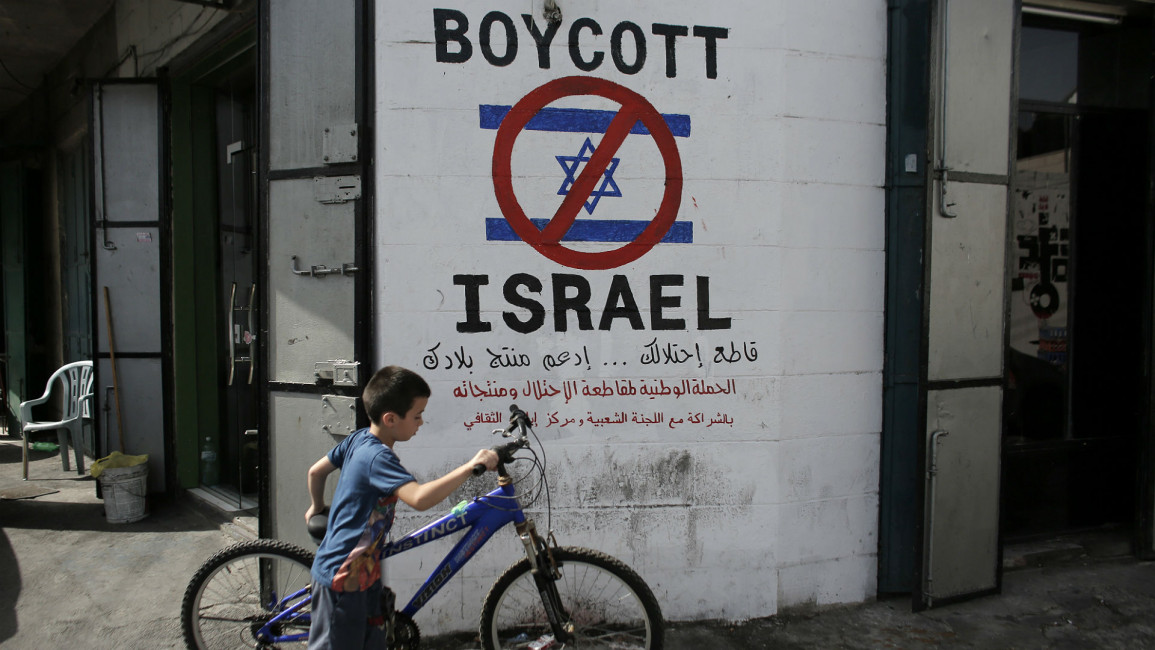Israeli court upholds anti-boycott law
Israeli court upholds anti-boycott law
Israel's top judicial panel rejected an appeal by several human rights groups against so called anti-boycott law, in effect criminalising any entity that calls for boycotting Israel.
2 min read
Growing calls for a boycott of Israel is worrying Tel Aviv. [AHMAD GHARABLI/AFP/Getty]
The Israeli Supreme Court delivered a 233-page judgement Wednesday rejecting most parts of a petition filed by human rights organisations and political movements against the so called anti-boycott law.
The legislation, which was held in reserve in 2011, was 'unfrozen' by Israel’s top judicial panel, and would allow lawsuits and penalties against companies, NGOs and individuals who attempt to impose a boycott on Israel or its illegal West Bank settlements constructed on Palestinain occupied land in violation of international law.
Lawyer Sawsan Zaher with Adalah ("Justice" in Arabic) an independent organization and legal cente for Arab rights in Israel described this law as "arbitrary" and harms Palestinians more than others.
"[Palestinians] are on the frontline struggling against the Occupation and the violation of the human rights of their people under Occupation in the West Bank and Gaza."
She stressed that the law is even more problematic for Palestinian in occupied East Jerusalem because it prevents them from using a main civil protest tool of boycott to end the Occupation.
The petitioners emphasised that the law violates the basic principle of equality because in other fields, such as consumer-related protests, bodies call for boycott without being subjected to to lawsuits for damages.
They argue that the Supreme Court will allow the state to allocate resources according to political views of institutions, and to marginalise entities that are critical of state policies and deprive them from access to such resources.
The legislation, which was held in reserve in 2011, was 'unfrozen' by Israel’s top judicial panel, and would allow lawsuits and penalties against companies, NGOs and individuals who attempt to impose a boycott on Israel or its illegal West Bank settlements constructed on Palestinain occupied land in violation of international law.
Lawyer Sawsan Zaher with Adalah ("Justice" in Arabic) an independent organization and legal cente for Arab rights in Israel described this law as "arbitrary" and harms Palestinians more than others.
"[Palestinians] are on the frontline struggling against the Occupation and the violation of the human rights of their people under Occupation in the West Bank and Gaza."
She stressed that the law is even more problematic for Palestinian in occupied East Jerusalem because it prevents them from using a main civil protest tool of boycott to end the Occupation.
The petitioners emphasised that the law violates the basic principle of equality because in other fields, such as consumer-related protests, bodies call for boycott without being subjected to to lawsuits for damages.
They argue that the Supreme Court will allow the state to allocate resources according to political views of institutions, and to marginalise entities that are critical of state policies and deprive them from access to such resources.



